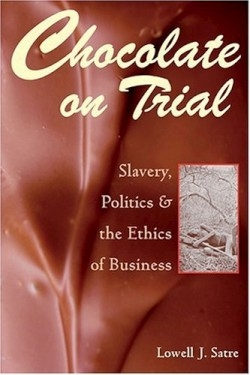Rich Releases for National Chocolate Day
National Chocolate Day, the day that we give in to our chocolate cravings and consume as much as we can get our hands on. And after our bellies are full of whatever our preference is, our only thought can be worth it. While you munch away on your stash of milk, dark, white, or peanut buttered chocolate, read one of these books to complete the experience. Happy eating!
Built on Chocolate
The Story of the Hershey Chocolate Company

James D. McMahon Jr.
General Publishing Group
Unknown $35.00 (208pp)
978-1-57544-033-0
Buy: Amazon
Chocolate lovers aren’t the only readers that will find this book about the Hershey Chocolate Company and its founder to be a treat, as it is a fascinating history of a man and how he turned his vision into a reality. It is an inspirational story of how Milton Hershey built on his desire to start his own confectionery business and despite two early business failures persevered to become one of the nation’s premier candy manufacturers and urban planners.
James D. McMahon, Jr., curator of collections and exhibitions at the Hershey Museum in Pennsylvania, enlivens his book with hundreds of photographs of Hershey packaging, advertising and related memorabilia from the Museum and community archives. One can’t get a full appreciation for the book until reviewing the visual examples of how the Hershey products evolved over the years and adapted to changing market conditions and consumer taste. It accurately reflects the marketing genius of Milton Hershey and his philanthropic efforts to provide for the community which included the residents of Hershey, Pennsylvania, the town that he was instrumental in developing around his Derry Township factory.
This is a nostalgic look at a true American success story, featuring a product that still has nationwide appeal today, with a message for today’s entrepreneurs that persistence can definitely pay off.
Desserted: Recipes and Tales from an Island Chocolatier
Kate Shaffer and Stacey Cramp 
Down East Books
Unknown $29.95 (128pp)
978-0-89272-991-3
Recipes from Black Dinah Chocolatiers, one of the most charming chocolate companies in the country.
“If you’ve ever had a fantasy of living on a Maine island, this book is for you. It,s just icing on the cake it that is also happens to involve chocolate. Kate Shaffer and her husband moved to remote Isle au Haut nearly seven years ago. Once there, they were inspired to open a chocolate company and cafe featuring delicious chocolate and fresh Maine ingredients. Now their products are shipped all over the world ~ and their island cafe is a true Maine destination. This armchair travel log and cookbook all in one describes the fantasies ~ and fantastic realities ~ of island life in Maine while featuring more than forty-five of Shaffer,s delicious recipes for her renowned chocolates and chocolate-inspired recipes from her seasonal cafe.”
Chocolate Chocolate Moons

Jackie Kingon
CreateSpace
Softcover $20.00 (398pp)
978-1-4775-6180-5
Buy: Local Bookstore (Bookshop), Amazon
Molly Summers is a gal who loves her chocolate. While working as a security guard at a factory where a particular candy is poisoned, the lead investigator points out that Molly had easy access to commit the crime. “Easy access but no motive,” she tells him. “I consider Godiva and Hershey saints and chocolate to be the food of the gods.”
Welcome to the twenty-fourth century, when overweight earthlings can travel to the moon and live in an atmosphere where they weigh nearly five times less than their actual weight. At first, it is heaven for the Neil Armstrong University-bound Molly and her heavyset boyfriend, Drew, but they soon break up when another girl comes between them.
Life goes on for Molly, and when readers meet up with her again she is married, the mother of twin fifteen-year-old daughters, and working security for the Culinary Institute of Mars, where the big question of the novel arises: why would someone want to sabotage the popular candy Chocolate Moons? With the help of her Martian best friend, Jersey, and Jersey’s husband—the half-human, half-machine, Trenton—Molly tries to solve the mystery.
Kingon is a teacher, artist, and writer who has had several short stories published, as well as articles in the New York Times. This rollicking, whimsical, tongue-in-cheek story is her debut novel.
Chocolate Chocolate Moons is reminiscent of the futuristic movies Total Recall and The Fifth Element—with an added dollop of Betty Crocker. Food is ever present in this alternate universe. In fact, many of Molly’s thoughts and feelings are associated with food: “I feel as light as a whipped egg white in a floating island dessert.”
Molly tells the story in first person and in present tense. However, the perspective becomes unclear at points because she seems to be an omnipotent narrator as well. Readers may overlook this, though, and focus instead on the multitude of pop-culture tie-ins the author purposely mangles. For instance, two of the newswomen mentioned are Barbara Bottled Waters and Katy Catty.
The dialogue between the characters is fresh and entertaining, as in this exchange between Molly and Jersey. Molly decides to order brownies to go, explaining, “Maybe I’ll take the order out and save them for later.” Jersey replies, “Ha, with you and chocolate, there is no ‘later!’”
The book’s cover is engaging and features a partial face shot of, presumably, the main character, mouth tantalizingly open, ready to plop in a Chocolate Moon candy. A darkened outer space serves as the background, complete with a crescent moon, several stars, and Saturn and its rings.
Those who like unusual stories served with a dose of humor will enjoy Molly’s out-of-this-world adventure.
ROBIN FARRELL EDMUNDS (October 17, 2012)
Chocolate on Trial
Slavery Politics and the Ethics of Business

Lowell J. Satre
Ohio State University Press
Unknown $55.00 (352pp)
978-0-8214-1625-9
Buy: Local Bookstore (Bookshop), Amazon
In 1909, the English press was abuzz with news about the libel trial of Cadbury Brothers vs. the London Standard newspaper. Cadbury, owned by the Quaker Cadbury family, had a reputation in England and abroad as a progressive and highly successful manufacturer of chocolate confectionery. The Cadburys, adherents to Quaker values and humanitarian policies, were members of the Anti-Slavery Society, as well as other liberal organizations in England.
Yet, critics began to call into question Cadbury’s business dealings with cocoa-bean plantations in the Portuguese colonies of Sao Tome and Principe. There was clear evidence that the “contracted laborers” were in fact slaves, who were condemned to a life of servitude, and who lived and worked in conditions that were not only deplorable, but inhuman.
The Standard, a conservative newspaper, was just one of many who began to look askance at Cadbury’s liberal ideals in light of mounting evidence that Sao Tome, as well as other Portuguese-run cocoa plantations, used slave labor. Why, the Standard asked, had Cadbury Brothers waited more than eight years to discontinue the purchase of cocoa from Sao Tome once it had been determined that Portugal sanctioned the use of servicases? As one reporter stated, “It is a strange instance of the topsy-turvydom of our economic arrangements that the cocoa and chocolate which are turned out in this country by philanthropic manufacturers … should have been grown under the most infamous and revolting conditions of murderous slavery.” Yet, this was not simply a moral issue, but one with significant political and economic implications.
The author, emeritus professor of history at Youngstown State University, weaves a spellbinding tale that explores the important socio-political and economic issues of the period. His meticulous research and deft characterization of the larger-than-life figures central to this historical account add value to this substantive book. From George Cadbury, son of the founder and chairman of the company, who sought to restore the reputation of the Cadbury family, to Henry Wood Nevinson, the journalist who first documented and described slavery in Portuguese West Africa and its other colonies, to William Cadbury, George’s nephew, who sought to influence Portugal to reform its labor practices, each is compelling and realistically portrayed.
Satre has written an important book, which serves as a cautionary tale for modern-day corporations. The question in 1909, as it is today, was to what extent should corporations be held accountable for the impact that adverse business practices have on other peoples and countries? To this, the author has provided an indisputable answer.
ROBIN DASHER-ALSTON (August 18, 2009)
Hannah Hohman
